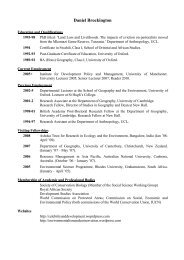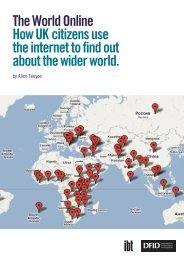World
Viewing the world - Full report
Viewing the world - Full report
- No tags were found...
Create successful ePaper yourself
Turn your PDF publications into a flip-book with our unique Google optimized e-Paper software.
III. Production study conducted by 3WEThe purpose of this study was to conduct interviews withkey decision-makers within the British televisionindustry in order to understand the industry perspectiveon television coverage of the developing world.The study selected 38 interviewees from the fiveBritish terrestrial channels (BBC1, BBC2, ITV, Channel 4,Channel 5) and from four satellite/cable channels (SkyOne, Sky News, Discovery, National Geographic). A fulllist of participants is given at the end of this chapter.The interviewees were drawn from across thetelevision hierarchy, from programme-makers todirectors of programmes. The majority were in the uppercommissioning levels, since these have the mostinfluence on programme output. The programmemakersworked in news, current affairs, documentariesand features programmes, the areas most likely to coverthe developing world. For collation purposes theinterviewees were broadly divided between policymakers/commissioningeditors on the one hand, andprogramme-makers on the other (Fig. 2).Fig. 2: Levels of ‘decision-makers’ as classifiedin the studyPolicy-makers LEVEL 1Director of programmesor channel controllerLEVEL 2Department heads orcommissioning editorsSchedulersProgramme- LEVEL 3makersProgramme editors orexecutive producersLEVEL 4Correspondents andproducersInterviews generally lasted for about an hour, andthey were all audio-recorded. They were based on aquestionnaire that pursued the following areas:● The nature of their output about the developingcountries: broad questions including the quantityand positioning of programmes in the schedules.● Detailed examination of their criteria used inpursuing programmes or news items on thedeveloping world – and the rationale behind therelevant criteria.● Features associated with successful output on thedeveloping world (such as style, scheduling, content,size of budgets).● Representation issues: interviewees’ perception ofthe accuracy and fairness with which theirprogrammes depict the developing world, andproblems relating to this.● Personal programme preferences and opinions,including beliefs about television’s role to informand the protection of public service ideals.The interviews took place between March and July1999, which happened to be a time of considerable publicdebate about television regulation and public serviceobligations 2 , as well as an exceptional time fortelevision’s foreign news staff covering the NATOoffensive on Kosovo.In addition to the 38 broadcasters interviewed, thesurvey included interviews with two directors ofprogramme sales and three advertising directors, in orderto gain perspectives on the broader commercial contextwithin which the broadcasters operate.2The BBC licence was under independent review. The BBC was also seeking a new Director-General, which led to much speculation about its future.And the ITC was putting pressure on ITV to continue to meet its news and current affairs obligations as it dropped News at Ten and rescheduled itsevening news programmes.DFID – July 2000 7





